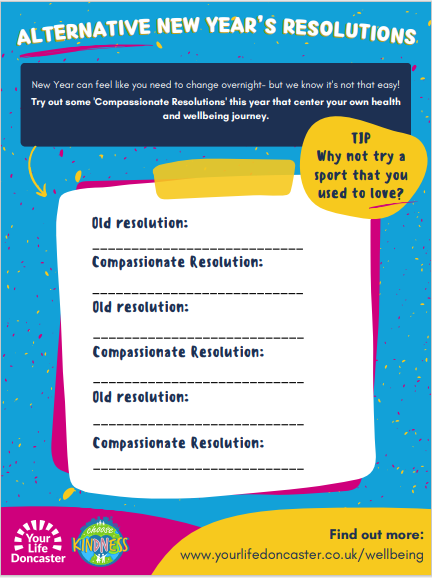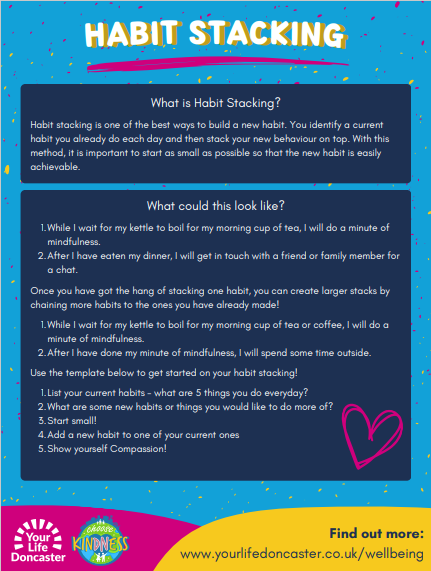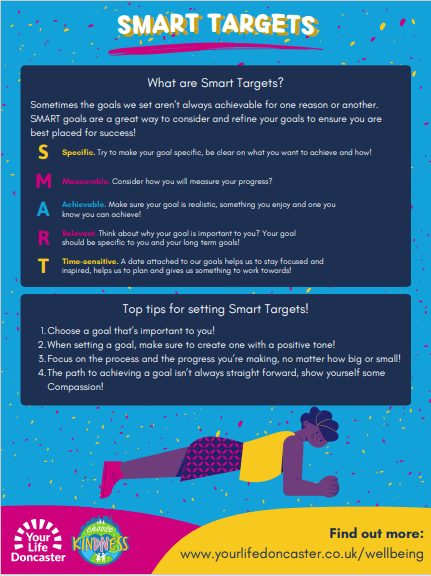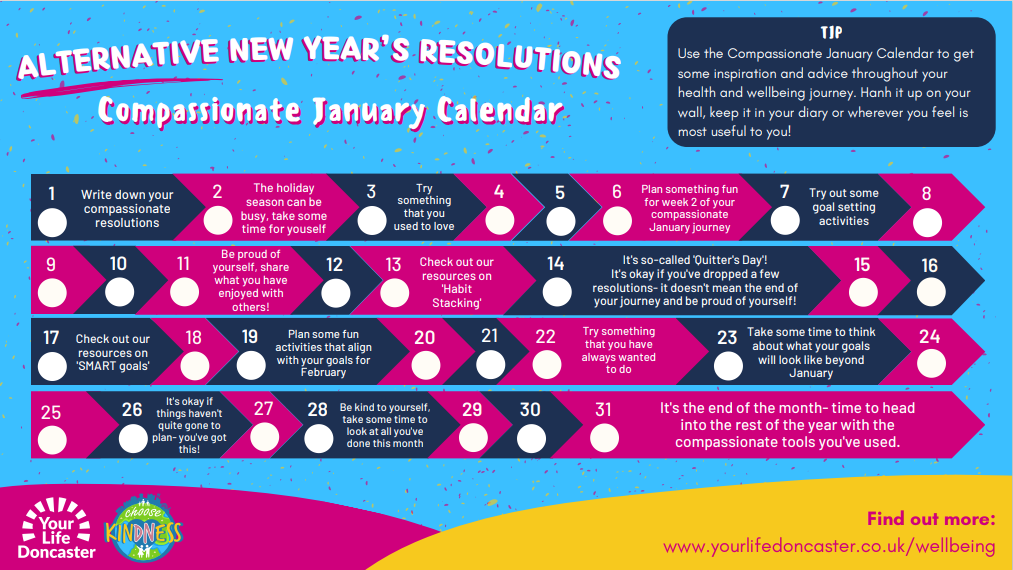Wellbeing

Alternative New Years Resolutions
Looking after your health and well being is important, but we know that there can sometimes be a lot of pressure to change our lives overnight. Being compassionate to yourself and seeking support to aid your goals can be really helpful. If you choose to set well-being goals this New Year, try asking yourself:
- What do I value most in my life?
- What motivates me?
- What can I add to my life to make it healthier or happier, rather than taking away?
Goal Setting Tools

Setting Alternative Resolutions
- Setting Alternative resolutions
- Download (187KB - PDF)

Habit Stacking
- Habit Stacking
- Download (397KB - PDF)

SMART Targets
- SMART Targets
- Download (399KB - PDF)

Compassionate January Calendar
- Compassionate January Calendar
- Download (367KB - PDF)
Five Ways to Wellbeing
It is really important that we pay attention to our own health and well-being and that of those around us. There is lots of support available throughout Doncaster that can help you manage your mental wellbeing and provide you with support.
Evidence suggests there are 5 steps you can take to help improve your mental health and well being. These these are to connect, be active, take notice, keep learning and give to others. There is lots available throughout Doncaster that you can get involved with to support your wellbeing.
Choose Kindness Ways to Wellbeing
For Mental Health Awareness Week, we've released some inspiration to support you to Choose Kindness for yourself and your wellbeing. These handy images have some great ways that you can follow the five ways to wellbeing in Doncaster to learn, give and connect with those around you. You can fing out more about Choose Kindness and take the pledge on our Choose Kindness webpage.png)
Choose Kindness Five Ways to Wellbeing
- Choose Kindness Five Ways to Wellbeing
- Download (399KB - PDF)
Connect
Spending time developing and nurturing relationships with friends, family, neighbours and colleagues is a great way of connecting and can improve your mental health and wellbeing. Here are justa a few ways that you can find ways to connect with your local community:
Community Directory
There are lots of fantastic groups and organisations across Doncaster that can support you to meet new people and try new activities, or get back into something that you used to love. The Your Life Doncaster community directory has a list of all of the groups and organisations in your area. It's a great way to see what is happening near you and to get involved in your local community.
Doncaster Green Space Network
Getting back to nature is a fantastic way to connect with the people and environment around us. It is not just being in nature but how we open ourselves up and interact with nature that counts. Even small contacts with nature can help to reduce feelings of isolation and support our mental health.Doncaster's Green Space network is a collaborative network of community groups, volunteers and organisations, with the ultimate goal of supporting each other and the natural environment around Doncaster.
The network is an opportunity for members to:
- Share valuable knowledge and experience with other members, offer and request support from others and deepen existing connections across the network
- Access further experience and training through the support of a national organisation, The Conservation Volunteers
- Work together to encourage more people to enjoy Doncaster's green spaces
- Work together to improve the presence of parks in Doncaster
- Promote and champion good practice
- Celebrate success for both parks and people.
You can find out more about how to get involved through the Get Doncaster Moving website.
Make use of technology
Technology has an important role to play in helping people to connect with others. There are lots of free apps and websites you can use such as WhatsApp, Facebook Messenger, FaceTime, Skype and Zoom. If you would like support and to learn more about how you can use technology to connect with family and friends, there are many courses and groups throughout Doncaster that can help you to connect digitally. Visit, the Voluntary Action Doncaster website to find out more.
Reach out to community groups for support
If you would like reassuring calls you can contact: Edlington Community Group on 01709 252549 or email Samantha, Helping Hands Community Centre 01709 863268, 07944759986 or communitysupport@hilltopcentre.org.uk
You can also volunteer by registering to call someone in isolation and help them stay connected:
- Silver Line - free confidential helpline providing information, friendship and advice to older people, open 24 hours a day, every day of the year
- b:friend - Become a telephone befriender to check-in on those that are vulnerable
Social Isolation Alliance
If you, or someone you know, is experiencing social isolation and loneliness and would like to connect with people in your community, Doncaster’s Social Isolation and Loneliness Alliance (SIA) may be able to assist. The SIA is a group of voluntary, community and faith sector organisations work together, throughout Doncaster, to help anyone who is experiencing social isolation and loneliness. The SIA can offer:
- A variety of activities in each community - allowing you to meet new people or try a new activity.
- Access to further support depending on your needs, including the Citizen’s Advice Bureau, the Job Centre, or other community groups within our network.
- Opportunities to develop your skills through basic IT programmes, volunteer opportunities, and training.
- Access to mental health and wellbeing support including counselling and peer support groups.
- Information about available financial support such as foodbanks or hygiene products.
- Specific support services, such as domestic abuse or carers support.
For further information, help or support, please visit the Social Isolation Alliance website or follow their facebook page.
Be Active
Being active is not just good for you physically, it has the power to do so much more – it can, for example, help prevent or manage medical conditions, reduce anxiety or stress, improve a person's confidence or self-esteem, or bring people from diverse backgrounds together. But how much activity should we be aiming for? There are guidelines for this, created by the UK Chief Medical Officer:
Let’s Get Doncaster Moving!
Get Doncaster Moving is a local partnership of people, groups, organisations and businesses who work together to support Doncaster communities to be active.
Try to find an activity that you enjoy, and that keeps you active, such as walking, swimming, cycling, playing football or even dancing around your kitchen! Evidence shows that an improvement in your physical health can help improve your mental health.
Keep moving - If you are unable to get out and about there are a lot of free exercises online for all ages and abilities, from yoga to dancing to HIIT sessions, you can find something that suits your abilities. Here are links with ideas and sessions:
- Follow Get Doncaster Moving on Facebook , Twitter and on the Get Doncaster Moving website for information and encouragement to move more, as well as information about local opportunities and support.
- Sport England Campaign Visit the website for lots of helpful information on keeping active in and outside of the home.
- Active Fusion have created a free resource pack for families to help keep children active.
- 10 min workouts Short on time? These 10-minute workouts might be ideal! These equipment-free fitness routines are great to do at home and short enough for you to easily fit them into your daily schedule
- Select your workout tutorial Choose a workout from the NHS Fitness Studio's range of online exercise videos. Take your pick from 24 instructor-led videos including aerobics exercise, strength and resistance, and pilates and yoga. These workouts have been created by fitness experts InstructorLive and range from 10 to 45 minutes.
- Seated Exercises These gentle sitting exercises will help improve your mobility and prevent falls, and can even be done at home. Don't worry if you've not done much for a while – these seated exercises are gentle and easy to follow.
- The Activity Alliance have produced guidance for disabled people on how to adapt physical activities to make them more accessible.
- Chartered Society of Physiotherapy has advice on how to increase physical activity for patients discharged from hospital.
- If you have one, utilise your garden space and use it to be active, gardening is a great form of exercise. There are ideas and advice for your garden on the Little Green Space website.
Community Led Walks
Doncaster has many community-led walking groups, where local people regularly meet up to walk together. You can find our more information through the Get Doncaster Moving website.
Working from home and keeping active
Being active whilst working from home can be tough and many of us may find we’re sitting longer and aching more than we usually would. To try and help manage this we have included some quick tips and resources:
- Try to move every 30minutes following the stretching guide
- If you can, try to set up a home-working station as similar to your usual desk as possible
- If you can, try to stand up whilst working, this can help posture, focus, and burn more calories than sitting.
- Try to have an active break (check out the home exercise suggestions above).
Take Notice
Being more aware of the present moment, the world around you and your own feelings and thoughts, can help you to positively change how you're feeling about life. It is extremely important to take notice of the signs associated with your own mental health and wellbeing and take steps to ensure you protect yourself and stay mentally well.
Reach out if you need mental health support
You can find support and further information on our mental health page. If you live in Doncaster and need support for anxiety, you can contact The Talking Shop at: 01302 565556. Anyone with a long term condition can call RDaSH’s Improving Access to Psychological Therapies Long Term Conditions Team on 01302 379563 or reach them via the Single Point of Access Team on 0800 804 8999. RDaSH have also produced a helpful guide of top tips to protect your mental health .
Looking after your mental health
- Rethink have suggestions on how to manage your mental health.
- Every Mind Matters offers expert advice and practical tips to help you look after your mental health and wellbeing. Find guidance, advice and tips on how to maintain your mental wellbeing as well as simple things you can do to maintain your mental wellbeing and deal with anxiety.
- Give yourself a good night’s sleep. Mental Health Foundation has ten top tips on getting a good night’s sleep.
- Mindfulness can help us enjoy life more and understand ourselves better. Here are links to information and videos mindfulness and managing anxiety:
- NHS Online You can even check your mood using their simple mood self-assessment quiz.
- Headspace offer access to some free meditations, sleep, and movement exercises to support people.
- Are there things you have always wanted to do but never had the time to do? Update your CV and look for the job you’ve always wanted. You could use old newspapers and magazine to create a vision/dream board to represent your goals and ideas and what is important to you. Spring is coming so you could take notice of the changes in your garden or whilst you are out exercising. Why not take photos or collect items to create artwork, or you could start a journal.
- Doncaster Mind offers wellbeing support in an around the borough. Offering a combination of:
-
- One to One Support
- Peer Support, Guided Learning and Wellbeing Sessions
- Counselling
- Support for those bereaved by Suicide
They run a range of activities, guided learning and wellbeing sessions throughout the year through Peer Support groups providing a safe space for people to share experiences and develop coping strategies.
Coping with bereavement
Coping with the loss of a loved one is one of the most difficult things to happen in our lives. During times of grief, there is somebody you can talk to and organisations that offer a range of support. Please see our coping with bereavement page.
Keep Learning
Learning new skills, or rediscovering an old one, is great for good mental health and development. Take a look in your cupboards and pull out the sewing machine or paints and get creative. It could be as simple as taking time to complete a crossword puzzle, word search or Sudoku; anything that encourages you to use your mind.
Doncaster Libraries
There is so much to get involved in at the many libraries across Doncaster. You can find information on all the groups and activities available at your local library through the Doncaster libraries website.
- The Skills Toolkit hosrts free, high quality courses put together by the Department for Education in collaboration with experts.
- Heritage Doncaster have created some wonderful activity packs for adults and children to learn about their heritage, their family history, and get creative with a variety of projects. You could even get involved with their 'Living Room Museum' project and share objects from your house which tell a unique story. Heritage Doncaster are also able to post out activity packs to those who can't easily access online resources.
- Doncaster Deaf Trust have launched a free online British Sign Language (BSL) course, which enables users to learn Level One BSL.
- The Open University has a huge range free online courses you can try.
- The Reader service has lots of ways in which you can keep reading and stay connected, such as online shared reading groups. They are also currently looking for Doncaster volunteers to become Reader Leaders, to find out more email ainemcgriffiths@thereader.org.uk
- You could listen to free TED talks which cover a wide range of topics.
- Have you always said you would like to learn a new language? There are lots of helpful videos on YouTube and free apps available like DuoLingo that can help you.
Maybe broaden your horizons and try something new. The Royal Opera House it's offering free broadcasts on its Facebook and YouTube channels. After they've been broadcast, performances will be available on those channels to view 'on-demand', so don't worry if you can't tune in at the times above. There's also free content from the Royal Opera House available on BBC iPlayer to watch anytime. Museums around the world are giving free virtual tours. Just search ‘Virtual Museum Tours’ or check out 10 of the best from around the world in this Guardian article .
Give
Helping others, saying thank you, or giving someone a smile can help to improve your self-esteem and improve your emotional health. You could look into volunteering in your local community which can help with building up new social networks and gaining experience if you're looking for a job. Find volunteering opportunities through Voluntary Action Doncaster.
Become a Buddy
Giving your time to help others can not only benefit people in your community, but it can also have a positive impact on your wellbeing too. There are many ways you can make a big difference to some of the most vulnerable young people in Doncaster. You could volunteer with the council as a buddy, spending a couple of hours a month to take a young person in care out to enjoy activities and build up a friendship along the way. Find out more details about the Buddy Scheme.
Fostering Opportunities
You could also become a foster carer and be there for a Doncaster child at a time when they most need a safe place to live be it for just a few days, months or on a more long-term basis. Fostering is one of the most fulfilling roles you can do, allowing you to shape and improve a young person’s life. Find out more about how you could foster for Doncaster on the council’s website.
Choose Kindness
One kind act can spark another. It can brighten a grey day, touch a stranger's heart and inspire a chain reaction of kindness. Doncaster's Choose Kindness movement celebrates and champions kindness across the city and the fantastic community spirit that has shone through in the toughest times. You can find out more about the movement and take the pledge on the Choose Kindness webpage.
Doncaster Council Wellbeing Team
The Wellbeing Team wants every person in Doncaster to live in the place they call home with the people and things that they love, in communities where they look out for one another, doing things that matter to them. Doncaster Council's Wellbeing Service is based on the principal of ensuring that all residents of Doncaster have access to support, advice and guidance to enable them to remain as safe and independent within their own communities for as long as possible.
The Wellbeing Service is available to all adults (over 18yrs) living in Doncaster and can provide support on a range of issues including: mental health, physical health, social isolation, as well as family support.
You can also access support from Community Conversation Points, sometimes referred to as Community Led Support (CLS) Hubs held at community venues in your local area – please visit Your Community Pages - YourLifeDoncaster for more information.
You can contact the wellbeing team via phone on 01302 735553, or by email: wellbeing@doncaster.gov.uk.
Be Well Doncaster
Be Well Doncaster is a free health and wellbeing service available across Doncaster to support you on your wellbeing journey.
Our fully trained health coaches can work with you on a one to one basis to improve your quality of life by setting small but manageable goals. Areas our coaches can support includes, but is not limited to:
- Managing a long term health condition
- Healthy eating
- Sleep issues
- Low mood
- Debt support
- Stress and anxiety
To speak to a coach simply text Bewell (all one word) followed by your full name and the area where you live to 82228. Your coach will be in touch to arrange an appointment between 9am-7pm, Monday to Friday at a community venue near you. For more information about Be Well support in your local area, visit the Be Well Doncaster facebook page.
Alcohol and Substance Misuse
Cutting down on alcohol can really support your overall wellbeing, including helping you to sleep better, improve skin conditions, stay healthy and improve your overall health and mental well-being. It is recommended that both men and women do not regularly drink more than 14 units a week.
Tips to help reduce the amount that you drink:
- Think about adding alcohol-free days into your diary
- Try an alcohol-free or low alcohol drink instead.
- Talk to your friends and family to let them know your plans, they may want to join in at the same time!
Many people drink to relax after a stressful day or if they are going through a difficult time in their life. However there are many productive methods aid with stress such as:
- Talking with others
- Heading out for a walk or exercising
- Trying some new activities in your local area.
Local help and support
There are many supportive groups in Doncaster for people who would like to cut down on the amount that they drink - talk to your GP who can help you and they might help you access local alcohol services. For further advice about overcoming an alcohol addiction contact Aspire Drug and Alcohol Services. You can also find support via:
Take some time out to watch High Five, a short public health commissioned film which promotes five ways to wellbeing in relation to drugs and alcohol recovery.
Drug and alcohol treatment services
Public Health works with the Safer Doncaster Partnership to prevent and raise awareness of adult substance misuse throughout Doncaster. Our focus is on recovery, enabling Doncaster residents to recover from their addiction to alcohol and/or drugs and to maintain harm reduction services. Information and support is also available to families, friends, carers, parents and children of those affected by drug addiction. The Aspire website has further information and support on drugs and alcohol in Doncaster.
Free and confidential services
Needle and syringe programmes are available via approved pharmacy sites which provide sterile injecting equipment to people who inject illicit drugs. They may also support adults who inject non-prescribed performance and image-enhancing drugs. The aim is to reduce the harm caused, particularly the spread of viruses such as hepatitis and HIV.
You can find a full list of needle and syringe programmes via the Doncaster Council website.
